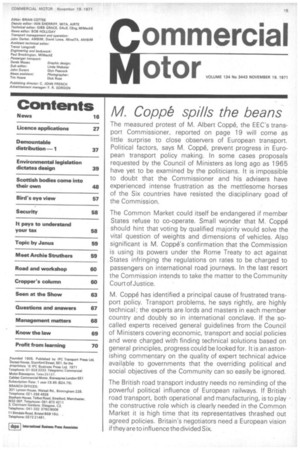M. Coppe spills the beans
Page 17

If you've noticed an error in this article please click here to report it so we can fix it.
The measured protest of M. Albert Coppe, the EEC's transport Commissioner, reported on page 19 will come as little surprise to close observers of European transport. Political factors, says M. Coppe, prevent progress in European transport policy making. In some cases proposals requested by the Council of Ministers as long ago as 1965 have yet to be examined by the politicians. It is impossible to doubt that the Commissioner and his advisers have experienced intense frustration as the mettlesome horses of the Six countries have resisted the disciplinary goad of the Commission.
The Common Market could itself be endangered if member States refuse to co-operate. Small wonder that M. Coppe should hint that voting by qualified majority would solve the vital question of weights and dimensions of vehicles. Also significant is M. Coppe's confirmation that the Commission is using its powers under the Rome Treaty to act against States infringing the regulations on rates to be charged to passengers on international road journeys. In the last resort the Commission intends to take the matter to the Community Court ofJustice.
M. Coppe has identified a principal cause of frustrated transport policy. Transport problems, he says rightly, are highly technical; the experts are lords and masters in each member country and doubly so in international conclave. If the socalled experts received general guidelines from the Council of Ministers covering economic, transport and social policies and were charged with finding technical solutions based on general principles, progress could be looked for. It is an astonishing commentary on the quality of expert technical advice available to governments that the overriding political and social objectives of the Community can so easily be ignored.
The British road transport industry needs no reminding of the powerful political influence of European railways. If British road transport, both operational and manufacturing, is to play the constructive role which is clearly needed in the Common Market it is high time that its representatives thrashed out agreed policies. Britain's negotiators need a European vision if they are to influence the divided Six.




















































































































